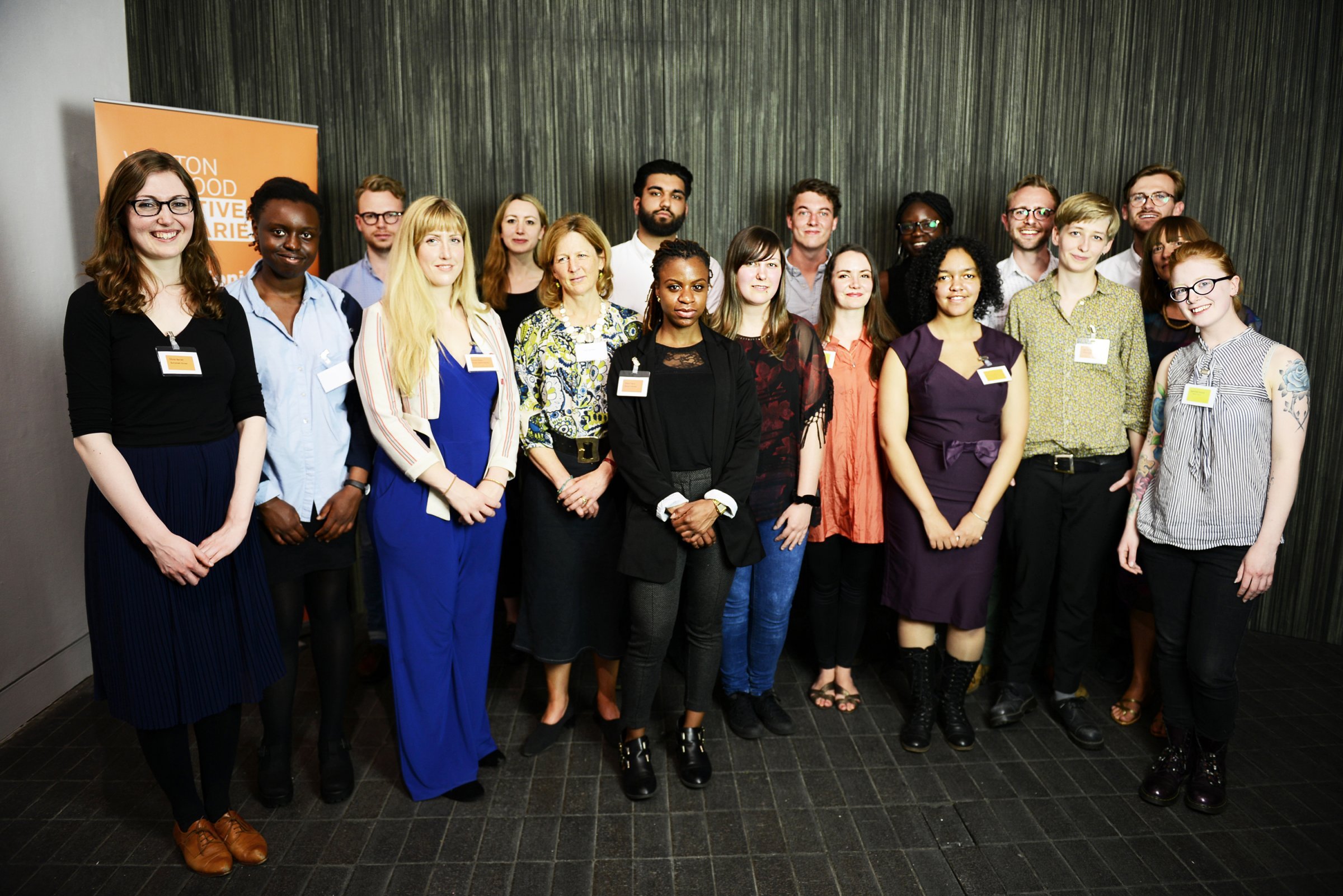
Salome, second from left, with the Weston Jerwood Creative Bursaries trainees
A perfect placement
Unable to take on unpaid work, Salome Wagaine thought she might be excluded from a career in the arts. Then she found out about the Weston Jerwood Creative Bursaries scheme.
“I don’t know anyone,” remarked one panel member at a discussion I attended this spring, “who works in theatre who hasn’t worked for free at some stage.” Given that working for free may include setting up your own theatre company and doing a small-scale production on the back of some other employment, this didn’t seem too bad to me. More dispiriting, however, were the comments that came when the floor was opened. People my age spoke about how they didn’t expect to land a job without first proving their enthusiasm for the sector and determination to work in it, and unpaid placements are of course a means of demonstrating this thirst. Others recounted job interviews at world-renowned London venues where staff bemoaned no longer being allowed to advertise unpaid internships. They felt that the ban placed upon them was bureaucratic and deprived those starting out with valuable opportunities. I left that day thinking it was unlikely I would find myself working in the sector. I was not in a position to work for free, much less work for free on a placement with no hope of a job at the end of it. I knew venues whose operations would cease to function without the constant source of young people running front of house, assisting stage management and working as general managers without even a weekly expenses allowance. It remains difficult to distinguish between a placement like that and one which, while unpaid, gives interns time to take up paid employment elsewhere.
As a sector the arts sees the value in diversity and understands that it is the best way to produce high-quality and sustainable work
One individual with limited experience not able to get work in a competitive sector may seem no great tragedy. However, elsewhere I was seeing large graduate recruiters making a point of increasing diversity in their workplaces on the grounds that having multiple perspectives are good for business. It seemed a shame then that the arts and cultural sector, which prides itself on its creativity and collaboration, continues to treat unpaid internships with such resignation.
Fast forward a few months and I now live in a new city (Glasgow) and work as a Weston Jerwood placement trainee for Cryptic, an organisation that produces a truly varied and exciting programme. In September we presented a showcase of Indonesian art across a range of genres including dance and puppetry and we are now working towards an eleven-day festival of sonic art. Since starting, I have been given the opportunity to contribute and learn in a role that’s been both challenging and rewarding. I am currently researching the ways digital technology and the internet can be used to engage audiences and improve Cryptic’s feedback and evaluation structures. It is the most self-contained piece of work I have had responsibility for in a job so far and, having spoken to other bursary recipients, I know that I am not alone in being trusted in this way. I have also been able to see amazing new work, such as at the Manchester International Festival, and received training and mentoring from leading cultural professionals. All of this has helped me to understand the way I would like to work in the future and what aspects of arts and culture really inspire and motivate me.
Being a Weston Jerwood creative bursary trainee is an opportunity that three months in, I know I have benefited from, especially in terms of confidence. However, even if I had not secured a placement, the sheer fact that the scheme exists means a lot. It sends out a clear signal that as a sector the arts sees the value in diversity and understands that it is the best way to produce high-quality and sustainable work. There are 40 such placements across the country, ranging from stage management to development to curation. We are based in youth theatres, art galleries, dance companies, theatres and cross-arts venues. Some people on the scheme had a passion for the field in which they are working from early on. Others, like me, only considered an arts career after leaving school once I’d been exposed to the variety within the sector.
The case for public investment and subsidy for the arts is under pressure with almost all government departments seeing a cut to their budgets. It is more important than ever for arts organisations to continue their efforts to open doors and experiences to people with different backgrounds, approaches and responses to the arts. Schemes like this one and the thinking behind them will be crucial in coming years, especially for publicly funded organisations.
Salome Wagaine is Digital User Researcher and Weston Jerwood creative bursaries trainee at Cryptic.
jerwoodcharitablefoundation.org/creative-bursaries
www.cryptic.org.uk
Join the Discussion
You must be logged in to post a comment.